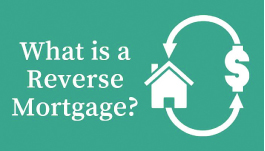Another aspect to homeowning, of course, is the acquisition of the home in th efirst place. An increasingly popular way of financing a home, especially for senior citizens. Below is some information that should help you understand what they’re all about.
MYTH 1: I cannot get a reverse mortgage if I have an existing mortgage.
FACT: False. If your house isn’t paid off, the proceeds you receive from the reverse mortgage must first be used to pay off any existing mortgage. This is the most common reason most homeowners 62 years and older take out a reverse mortgage.
MYTH 2: If I take out a reverse mortgage the lender will own my home.
FACT: False. Homeowners still retain title and ownership to their homes during the life of the loan, and can choose to sell the home at any time. As long as the borrower continues to live in and maintain the home and property taxes and homeowners insurance are paid, the loan cannot be called due.
MYTH 3: There are restrictions on how reverse mortgage proceeds may be used.
FACT: False. There are no restrictions. The cash
proceeds from the reverse mortgage can be used for virtually any purpose and borrowers
should be cautious of lenders attempting to cross sell other products. Many seniors have used reverse mortgages to pay off debt, help their kids, make ends meet or have a financial
reserve.
MYTH 4: Only low-income seniors get reverse mortgages.
FACT: False. Although some seniors may have a greater need than others for the monthly proceeds or lump sum funds reverse mortgages offer, most simply prefer to be free of monthly mortgage payments. Without monthly mortgage payments, many homeowners find they can maintain their existing quality of life and build their savings to help with futureexpenses. A growing number of people who have no immediate need are taking out these
loans so that they have a financial cushion for future expenses.
MYTH 5: If I outlive my life expectancy, the lender will evict me.
FACT: False. Reverse mortgage lenders put no time limit on how long borrower(s) can stay in their homes. Since homeowners still own the property, lenders cannot evict them as long as the borrower continues to live in and maintain the home, and property taxes and
homeowners insurance are paid.
MYTH 6: A reverse mortgage will affect my government benefits.
FACT: A reverse mortgage generally does not affect regular Social Security or Medicare benefits. However, if you are on Medicaid, any reverse mortgage proceeds that you receive
would count as an asset and could impact Medicaid eligibility. To be sure, we recommend
that potential borrowers consult their federal benefits administrators or financial advisors.
MYTH 7: There are no objective advisors available to seniors trying to decide if a reverse mortgage suits their needs.
FACT: False. Borrowers are required to work with independent, third party counselors approved by the U.S. Department of Housing and Urban Development (HUD) in their local communities. This educational session helps them make the right decision for their unique
situations.
MYTH 8: My children will be responsible for the repayment of the loan.
FACT: If the borrower or their estate wants to retain the property, the balance must be paid
in full. However, as long as the borrower or their estate sells the property to pay off the debt, there is no recourse if the HECM loan balance exceeds the home’s value at maturity. Any equity remaining in the property after the reverse mortgage is retired belongs to the borrower or their estate.
MYTH 9: Reverse mortgage lenders take advantage of seniors.
FACT: Seniors who have been victims of reverse mortgage lending schemes are extreme exceptions and typically victims of unsavory lenders. As a consumer, you should only work with reputable lenders. Protect yourself by conducting as much research as possible by consulting government agencies, your financial advisors and NRMLA, the National Reverse Mortgage Lender’s Association.
MYTH 10: I’ve heard I won’t qualify for a reverse mortgage because of my limited income.
FACT: Although traditional mortgages require higher income qualifications and credit scores; the HECM also has financial requirements that must be met to ensure adequate resources to maintain property taxes, home owners insurance and HOA dues if applicable. These requirements may limit some borrowers ability to qualify, but you don’t know until you try.

